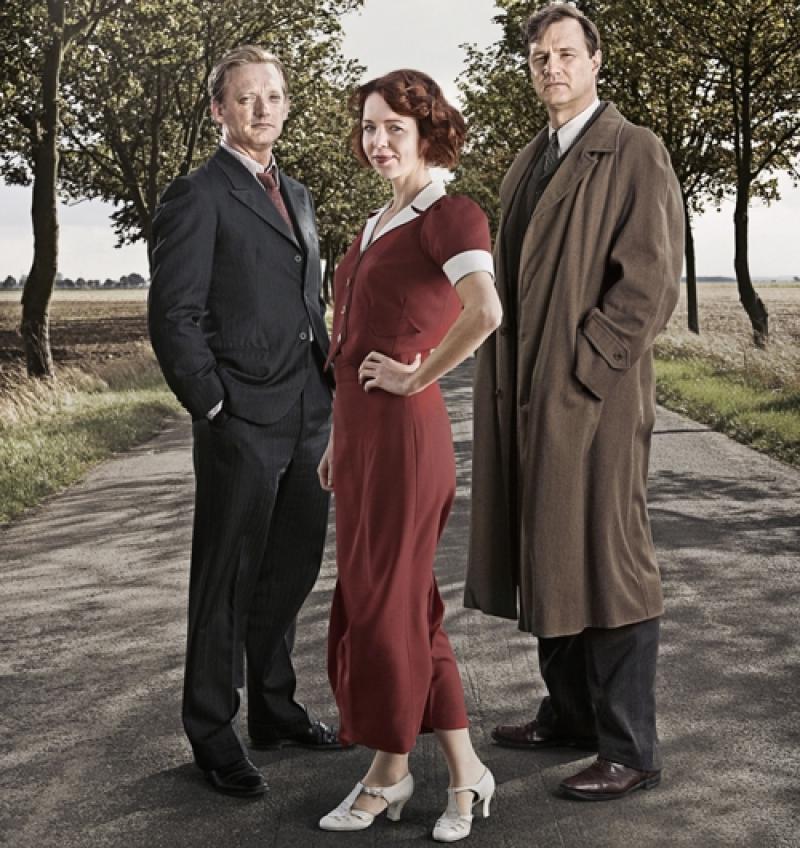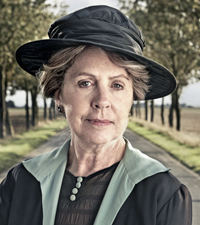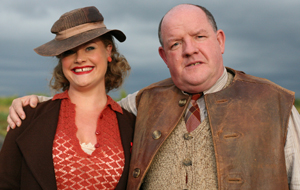South Riding, BBC One | reviews, news & interviews
South Riding, BBC One
South Riding, BBC One
Winifred Holtby's 1930s classic gets a rollicking Andrew Davies makeover

You can see why the BBC's drama gurus wanted to have a go at remaking South Riding, which last came around in 1974's hit version from Yorkshire Television. It has drama, romance, social conflict, lofty ideals and looks a bit like a parable for our cash-strapped times.
Winifred Holtby's 1936 novel, which was published the year after its author's death, is a story of Yorkshire folk at several levels of society, from the poor living in a collection of squalid shacks on a cliff-top to the gallery of rogues and idealists who comprise the local council, and a middle-class landowner struggling to survive without having to sell his home. The nation is in the throes of recession, but some local councilmen want to spend their way out of it with a programme of works for the public good. By 'eck, I bet that Mr Osborne can feel his ears burning.
Into the midst of all this comes Sarah Burton (Anna Maxwell Martin), the daughter of a local blacksmith who has spent the last 20 years teaching in London and around assorted outposts of Empire. She's applying for the post of headmistress at the local Kiplington High School for Girls. She has breathtakingly "progressive" ideas about the education of young women, including the extraordinary notion that marriage needn't be their life's sole ambition. Echoing the author's own experiences of the First World War, and Ms Burton's own wartime bereavement, she deplores any notions of sending the menfolk out again to be mown down in droves.
 It's terribly easy to watch, and the characters are virtually colour-coded for ease of identification. Ms Burton is the kind of teacher everybody wishes they'd had. She mixes discipline with spontaneity, is able to inspire with a well-chosen reading from D H Lawrence, and exhorts her pupils to express themselves freely on the page (heart-warmingly, it's Lydia Holly, a poor girl from the shacks, who displays the greatest creative ability). Burton finds some female solidarity with alderwoman Mrs Beddows (a firm yet sympathetic Penelope Wilton, pictured right), who champions her energy and imagination, though has to cool her ardour for spending pots of dosh on refurbishing the school.
It's terribly easy to watch, and the characters are virtually colour-coded for ease of identification. Ms Burton is the kind of teacher everybody wishes they'd had. She mixes discipline with spontaneity, is able to inspire with a well-chosen reading from D H Lawrence, and exhorts her pupils to express themselves freely on the page (heart-warmingly, it's Lydia Holly, a poor girl from the shacks, who displays the greatest creative ability). Burton finds some female solidarity with alderwoman Mrs Beddows (a firm yet sympathetic Penelope Wilton, pictured right), who champions her energy and imagination, though has to cool her ardour for spending pots of dosh on refurbishing the school.
At first, Robert Carne (the aforesaid landowner with the cashflow problem, played by David Morrissey) greets Burton's lofty ambitions with scowls and gruffness, though we know immediately that the bristling tension between them can only mean a wild love affair by, ooh, let's say the end of episode two. There are only three episodes, incidentally. Though Morrissey's performance runs the gamut from brown to beige, he manages to convey effectively the Powerful Man Who Has Known Sorrow, and is silently crying out for the love of a good woman (Mr Rochester, is that really you?). His tragic marriage to Muriel, the daughter of Lord Sedgemire whose portrait still gazes down haughtily in his hallway, has left him with a dark secret and a neurotic daughter called Midge.
 Still, it looks as though Carne may have a love rival in Joe Astell (Douglas Henshall), a former Glasgow communist now trying to convince his fellow councillors to fling money at an idealistic Bauhaus-style housing project. Carne objects that they're skint and now isn't the right time, but Anthony Snaith (Peter Firth) not only wants to make poverty history, but detects a splendid opportunity to profit from land speculation. Meanwhile Alfred Huggins (John Henshaw), a Methodist minister plagued by a weakness of the flesh, looks as if he's going to come unstuck over his knee-trembling relationship with Bessy Warbuckle (Janine Mellor), who looks as if she stepped out of a Donald McGill postcard from Scarborough (Mellor and Henshaw, pictured above).
Still, it looks as though Carne may have a love rival in Joe Astell (Douglas Henshall), a former Glasgow communist now trying to convince his fellow councillors to fling money at an idealistic Bauhaus-style housing project. Carne objects that they're skint and now isn't the right time, but Anthony Snaith (Peter Firth) not only wants to make poverty history, but detects a splendid opportunity to profit from land speculation. Meanwhile Alfred Huggins (John Henshaw), a Methodist minister plagued by a weakness of the flesh, looks as if he's going to come unstuck over his knee-trembling relationship with Bessy Warbuckle (Janine Mellor), who looks as if she stepped out of a Donald McGill postcard from Scarborough (Mellor and Henshaw, pictured above).
It all tumbles along at breakneck speed, and you can't help feeling that three episodes isn't going to be nearly enough.
Explore topics
Share this article
The future of Arts Journalism
You can stop theartsdesk.com closing!
We urgently need financing to survive. Our fundraising drive has thus far raised £33,000 but we need to reach £100,000 or we will be forced to close. Please contribute here: https://gofund.me/c3f6033d
And if you can forward this information to anyone who might assist, we’d be grateful.

Subscribe to theartsdesk.com
Thank you for continuing to read our work on theartsdesk.com. For unlimited access to every article in its entirety, including our archive of more than 15,000 pieces, we're asking for £5 per month or £40 per year. We feel it's a very good deal, and hope you do too.
To take a subscription now simply click here.
And if you're looking for that extra gift for a friend or family member, why not treat them to a theartsdesk.com gift subscription?
more TV
 Flintoff, Disney+ review - tumultuous life and times of the great all-rounder
John Dower's documentary is gritty, gruelling and uplifting
Flintoff, Disney+ review - tumultuous life and times of the great all-rounder
John Dower's documentary is gritty, gruelling and uplifting
 Your Friends & Neighbors, Apple TV+ review - in every dream home a heartache
Jon Hamm finds his best role since 'Mad Men'
Your Friends & Neighbors, Apple TV+ review - in every dream home a heartache
Jon Hamm finds his best role since 'Mad Men'
 MobLand, Paramount+ review - more guns, goons and gangsters from Guy Ritchie
High-powered cast impersonates the larcenous Harrigan dynasty
MobLand, Paramount+ review - more guns, goons and gangsters from Guy Ritchie
High-powered cast impersonates the larcenous Harrigan dynasty
 This City is Ours, BBC One review - civil war rocks family cocaine racket
Terrific cast powers Stephen Butchard's Liverpool drug-ring saga
This City is Ours, BBC One review - civil war rocks family cocaine racket
Terrific cast powers Stephen Butchard's Liverpool drug-ring saga
 The Potato Lab, Netflix review - a K-drama with heart and wit
Love among Korean potato-researchers is surprisingly funny and ideal for Janeites
The Potato Lab, Netflix review - a K-drama with heart and wit
Love among Korean potato-researchers is surprisingly funny and ideal for Janeites
 Adolescence, Netflix review - Stephen Graham battles the phantom menace of the internet
How antisocial networks lead to real-life tragedy
Adolescence, Netflix review - Stephen Graham battles the phantom menace of the internet
How antisocial networks lead to real-life tragedy
 Drive to Survive, Season 7, Netflix review - speed, scandal and skulduggery in the pitlane
The F1 documentary series is back on the pace
Drive to Survive, Season 7, Netflix review - speed, scandal and skulduggery in the pitlane
The F1 documentary series is back on the pace
 A Cruel Love: The Ruth Ellis Story, ITV1 review - powerful dramatisation of the 1955 case that shocked the public
Lucy Boynton excels as the last woman to be executed in Britain
A Cruel Love: The Ruth Ellis Story, ITV1 review - powerful dramatisation of the 1955 case that shocked the public
Lucy Boynton excels as the last woman to be executed in Britain
 Towards Zero, BBC One review - more entertaining parlour game than crime thriller
The latest Agatha Christie adaptation is well cast and lavishly done but a tad too sedate
Towards Zero, BBC One review - more entertaining parlour game than crime thriller
The latest Agatha Christie adaptation is well cast and lavishly done but a tad too sedate
 Bergerac, U&Drama review - the Jersey 'tec is born again after 34 years
Damien Molony boldly follows in the hallowed footsteps of John Nettles
Bergerac, U&Drama review - the Jersey 'tec is born again after 34 years
Damien Molony boldly follows in the hallowed footsteps of John Nettles
 A Thousand Blows, Disney+ review - Peaky Blinders comes to Ripper Street?
The prolific Steven Knight takes us back to a squalid Victorian London
A Thousand Blows, Disney+ review - Peaky Blinders comes to Ripper Street?
The prolific Steven Knight takes us back to a squalid Victorian London
 Zero Day, Netflix review - can ex-President Robert De Niro save the Land of the Free?
Panic and paranoia run amok as cyber-hackers wreak havoc
Zero Day, Netflix review - can ex-President Robert De Niro save the Land of the Free?
Panic and paranoia run amok as cyber-hackers wreak havoc

Add comment